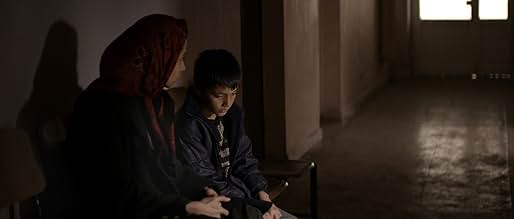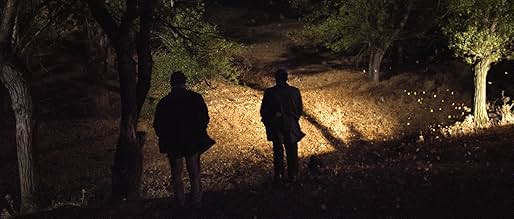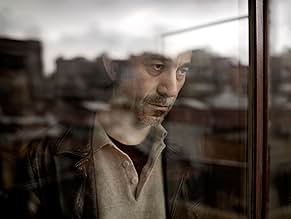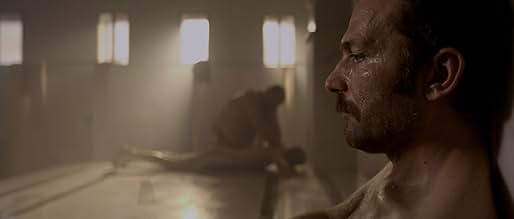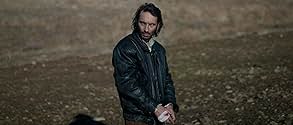IMDb-BEWERTUNG
7,8/10
52.437
IHRE BEWERTUNG
Eine Gruppe von Männern macht sich auf die Suche nach einer Leiche in der anatolischen Steppe.Eine Gruppe von Männern macht sich auf die Suche nach einer Leiche in der anatolischen Steppe.Eine Gruppe von Männern macht sich auf die Suche nach einer Leiche in der anatolischen Steppe.
- Regie
- Drehbuch
- Hauptbesetzung
- Auszeichnungen
- 21 Gewinne & 34 Nominierungen insgesamt
Empfohlene Bewertungen
Nuir Bilge Ceylon's "Once Upon a Time in Anatolia" is the complete antithesis to the conventional American crime drama, which routinely features detectives with matinée-idol looks, an assortment of plot twists and red herrings, and a series of breath-bating car chases to keep the masses from bolting for the exits.
"Once Upon a Time in Anatolia" has none of these. In fact, it features a cast of balding, sagging, middle-aged men - a police chief, a prosecutor, a doctor and two murder suspects - who have gone on a night- long search, through the dour planes of Turkey, in search of a buried body. As the night drags on, the men engage in a series of long, angst- ridden conversations that reveal how their constant exposure to and intimate involvement with the sordid and depraved aspects of the human condition have made them pessimistic and cynical about life. Yet, in the end, at least one of the characters finds a way, through a bit of professional compromise, to bring a little less darkness into the world.
Meanwhile, at every step in the drama, the movie drains the process of crime detection of all its "glamour."
It's a long - 157-minutes long, in fact - methodical, and frequently ponderous journey into the heart of darkness, but fine performances and a complete lack of conventionality make it a trip worth taking.
"Once Upon a Time in Anatolia" has none of these. In fact, it features a cast of balding, sagging, middle-aged men - a police chief, a prosecutor, a doctor and two murder suspects - who have gone on a night- long search, through the dour planes of Turkey, in search of a buried body. As the night drags on, the men engage in a series of long, angst- ridden conversations that reveal how their constant exposure to and intimate involvement with the sordid and depraved aspects of the human condition have made them pessimistic and cynical about life. Yet, in the end, at least one of the characters finds a way, through a bit of professional compromise, to bring a little less darkness into the world.
Meanwhile, at every step in the drama, the movie drains the process of crime detection of all its "glamour."
It's a long - 157-minutes long, in fact - methodical, and frequently ponderous journey into the heart of darkness, but fine performances and a complete lack of conventionality make it a trip worth taking.
I watched "Bir Zamanlar Anadolu'da" just a couple of hours ago and wanted to write a review immediately before the satisfaction it provides fades away. In one word, it's a marvellous film which should not be missed!
The scenery and the images are fantastic. The journey motif makes it the lives that cross one another familiar. And the acting! It totally blew my mind! It seems as if the director is really relating the story of a group of people without ever making his presence felt. It does not feel like you are watching a film at all but from the very first moment you are taken in by the film.
I want to congratulate Nuri Bilge Ceylan and all those contributors in this manner. This was his first film I've ever watched and I'll watch the rest at once without any delay. I already feel like I've lost a lot of my precious time...
Thanks a lot for this cinematographic marvel, people like you make us realise that cinema is in truth an art; one which keeps mesmerising us all...
The scenery and the images are fantastic. The journey motif makes it the lives that cross one another familiar. And the acting! It totally blew my mind! It seems as if the director is really relating the story of a group of people without ever making his presence felt. It does not feel like you are watching a film at all but from the very first moment you are taken in by the film.
I want to congratulate Nuri Bilge Ceylan and all those contributors in this manner. This was his first film I've ever watched and I'll watch the rest at once without any delay. I already feel like I've lost a lot of my precious time...
Thanks a lot for this cinematographic marvel, people like you make us realise that cinema is in truth an art; one which keeps mesmerising us all...
Peering through the monotony of everyday lives to pose larger questions about purpose & existence, Once Upon a Time in Anatolia is a quiet, somber & reflective mood piece that finds beauty in the mundane and expertly employs its police procedural structure as a narrative framework to unearth deeper existential insights.
Co-written & directed by Nuri Bilge Ceylan, the plot covers a night & day in the lives of people involved in a murder investigation but doesn't adhere to any of its genre's conventions. Ceylan's composed & controlled direction keeps a firm check on every single aspect, and provides an expansive canvas for its characters to develop.
From the distant shots of the vast Anatolian steppes to detailed close-ups of its characters, Cinematography definitely stands out, whether it's the images filmed during nighttime or captured in daylight. Editing is methodical throughout, deliberately unfolding the plot at a silent & glacial pace. And sincere performances from its entire cast makes sure that the interest is never lost.
Overall, Once Upon a Time in Anatolia is an ingeniously crafted & patiently narrated drama that presents the Turkish filmmaker in total control of his craft and, despite its intimidating 157 mins runtime, manages to be an utterly absorbing & engrossing experience. Its slow & undramatic approach can be too frustrating for some but for the rest, it is as rewarding a film such as this can get. One of the best films of the decade.
Co-written & directed by Nuri Bilge Ceylan, the plot covers a night & day in the lives of people involved in a murder investigation but doesn't adhere to any of its genre's conventions. Ceylan's composed & controlled direction keeps a firm check on every single aspect, and provides an expansive canvas for its characters to develop.
From the distant shots of the vast Anatolian steppes to detailed close-ups of its characters, Cinematography definitely stands out, whether it's the images filmed during nighttime or captured in daylight. Editing is methodical throughout, deliberately unfolding the plot at a silent & glacial pace. And sincere performances from its entire cast makes sure that the interest is never lost.
Overall, Once Upon a Time in Anatolia is an ingeniously crafted & patiently narrated drama that presents the Turkish filmmaker in total control of his craft and, despite its intimidating 157 mins runtime, manages to be an utterly absorbing & engrossing experience. Its slow & undramatic approach can be too frustrating for some but for the rest, it is as rewarding a film such as this can get. One of the best films of the decade.
A dark cold night over the Turkish steppes, an entourage of police detectives, a commissioner, a doctor, and two grim prisoners in tow search for a dead body for over 2 hours in the darkest part of the night. What appears to be a good setup for the latest police procedural, crime fiction, thriller, even midnight horror turns out unexpected intensely revealing character portraits, in a most exhaustive and surprisingly humorous way. Recreating his earlier slow burn meditations, yet with a new sense of maturity "Anatolia" is true to the real rhythms of night, the frustrations of waiting for the crucial evidence to appear, the vagueness of memory, remembrance of traumatic events in love and in murder and the bleakness of night of the eternal night and unwelcome truths revealed by the day.
One senses the tedium and frustration of the murder investigation, simultaneously the dread and anticipation of revealing the dead body in it's gory realism, the salacious details resulting in the murder itself and the public crucification of the culprits Anatolia however is almost an antithesis to the psychological revelations over the course of the night.
Before (and if) we reach the major discovery, the police officers and commissar reveal their aversions to murder, mortality, the search for a guilty suspect before the evidence is revealed, their cultural differences, assumptions about class differences, marriage, and human nature. Throughout the eternal stillness of night, poetic treatises about life, death and love are superimposed over cracks of thunder, howling winds and pattering rains, the harsh spotlight of car headlamps contrast with the comforting glow of a flickering lantern on a village porch.
The search is tedious and frustrating for both the officers and the audience, as much as the motives are unclear, like love, life, and marriage. The ambiguity of night is as unclear as the motives for murder, does daybreak reveal anything revelatory, and does the dissection of a murder case hours and days after its uncovering reveal any truth into it's motives or human nature itself?
The audience should be wiser against the small town working-class police task-force just following orders; they may empathise more with the reflective and sensitive Doctor Cemal or the cunning and charismatic Prosecutor Nusret, yet under the surface, their own personal lives in marriage and children are vexed, the investigation is almost a respite from these frustrations. The commissioner seems haunted by his ill wife, yet on the surface, this is treated as a running joke, later, it reveals thematic links to the search for answers in the unknown murder case. Similarly the doctor tries to make peace with his conscience about a past personal relationship. The impression of him is the most sensible, grounding the moral compass, yet his flaws are also revealed by daylight.
Contrasts between these characters and the murder suspect who appears (at least on the surface) to be more emotionally stable than many of the prosecutors is complex and kaleidoscopic. This is a remarkable introspective film ostensibly exploring a murder case and therefore guilt and conscience, yet further introspection reveals riffs on love story(ies), female roles, family, honour, class prejudice and the legal system.
Women appear seldom in the film, some wives are talked about yet, their effect on the men (and audience) is haunting, magnetic, and enigmatic. The small towns which they stop at along their road trip are barren, simple, country-like, impressing the sense of isolation both physically and more saliently, emotionally. The appearance of women and children in these towns is revelatory and thirst-quenching. Therefore a lot of time spent for introspection and meditation, watching how the characters reacting to the tedium, stress, fatigue and mortality of a long hard night.
The terrain of Anatolia is a foreboding character in itself with it's rolling fields illuminated by the sharp piercing car headlights slicing the night like snippets revealed about each character - yet the whole picture remains hidden. A storm is sensed coming both literally and figuratively, the expectant howling winds like ghosts of the dead and the memories of the characters across the unforeseeable terrain. The mood is incredibly poetic, rhythmically blending with the sounds of the whistling winds, the crunch of icy gravel, pattering of rain, and fluttering pigeons, all in the emptiness of night.
Nuri Bilge Ceylan's previous films have been sombre (frustrations) meditations on human nature, such as the brewing storm in 3 Monkeys, the solitude of cascading snow and the cracking waves of the harbour in Distant, to the scorching blistering summer in Climates; environment and mood work in integration in his work. In "Anatolia", the moods over the windy plains are as intense as the brewing moods in the characters.
The scenes of the cars rolling across the plains lit only by the headlights occupy the initial part of the film. They run almost in real time; with the wind whipping though grass and plains they form a stark, haunting and grim atmosphere. There are bravura haunting scenes like the rolling apple down the hill, whilst initially seemingly superfluous, yet curious it's implications to reveal characters' current moods and eventual outcomes. And the the colloquial dinner at the mayor house under the swaying candlelight, then in pitch darkness, the light revealing (literally) different shades of each character; they the revelation (apparition) of a miraculous figure moments later is spellbinding.
This is cinema with the highest respect for the audience, yet Ceylan has said that he wants to bore the audience, "because out of boredom might come a miracle - maybe days later, maybe years." Not sure whether to take this seriously however what it does demonstrate is a greater onus on viewer to think actively about the story and the consequences; out of deep reflection perhaps may come a revelation about the characters and ourselves.
One senses the tedium and frustration of the murder investigation, simultaneously the dread and anticipation of revealing the dead body in it's gory realism, the salacious details resulting in the murder itself and the public crucification of the culprits Anatolia however is almost an antithesis to the psychological revelations over the course of the night.
Before (and if) we reach the major discovery, the police officers and commissar reveal their aversions to murder, mortality, the search for a guilty suspect before the evidence is revealed, their cultural differences, assumptions about class differences, marriage, and human nature. Throughout the eternal stillness of night, poetic treatises about life, death and love are superimposed over cracks of thunder, howling winds and pattering rains, the harsh spotlight of car headlamps contrast with the comforting glow of a flickering lantern on a village porch.
The search is tedious and frustrating for both the officers and the audience, as much as the motives are unclear, like love, life, and marriage. The ambiguity of night is as unclear as the motives for murder, does daybreak reveal anything revelatory, and does the dissection of a murder case hours and days after its uncovering reveal any truth into it's motives or human nature itself?
The audience should be wiser against the small town working-class police task-force just following orders; they may empathise more with the reflective and sensitive Doctor Cemal or the cunning and charismatic Prosecutor Nusret, yet under the surface, their own personal lives in marriage and children are vexed, the investigation is almost a respite from these frustrations. The commissioner seems haunted by his ill wife, yet on the surface, this is treated as a running joke, later, it reveals thematic links to the search for answers in the unknown murder case. Similarly the doctor tries to make peace with his conscience about a past personal relationship. The impression of him is the most sensible, grounding the moral compass, yet his flaws are also revealed by daylight.
Contrasts between these characters and the murder suspect who appears (at least on the surface) to be more emotionally stable than many of the prosecutors is complex and kaleidoscopic. This is a remarkable introspective film ostensibly exploring a murder case and therefore guilt and conscience, yet further introspection reveals riffs on love story(ies), female roles, family, honour, class prejudice and the legal system.
Women appear seldom in the film, some wives are talked about yet, their effect on the men (and audience) is haunting, magnetic, and enigmatic. The small towns which they stop at along their road trip are barren, simple, country-like, impressing the sense of isolation both physically and more saliently, emotionally. The appearance of women and children in these towns is revelatory and thirst-quenching. Therefore a lot of time spent for introspection and meditation, watching how the characters reacting to the tedium, stress, fatigue and mortality of a long hard night.
The terrain of Anatolia is a foreboding character in itself with it's rolling fields illuminated by the sharp piercing car headlights slicing the night like snippets revealed about each character - yet the whole picture remains hidden. A storm is sensed coming both literally and figuratively, the expectant howling winds like ghosts of the dead and the memories of the characters across the unforeseeable terrain. The mood is incredibly poetic, rhythmically blending with the sounds of the whistling winds, the crunch of icy gravel, pattering of rain, and fluttering pigeons, all in the emptiness of night.
Nuri Bilge Ceylan's previous films have been sombre (frustrations) meditations on human nature, such as the brewing storm in 3 Monkeys, the solitude of cascading snow and the cracking waves of the harbour in Distant, to the scorching blistering summer in Climates; environment and mood work in integration in his work. In "Anatolia", the moods over the windy plains are as intense as the brewing moods in the characters.
The scenes of the cars rolling across the plains lit only by the headlights occupy the initial part of the film. They run almost in real time; with the wind whipping though grass and plains they form a stark, haunting and grim atmosphere. There are bravura haunting scenes like the rolling apple down the hill, whilst initially seemingly superfluous, yet curious it's implications to reveal characters' current moods and eventual outcomes. And the the colloquial dinner at the mayor house under the swaying candlelight, then in pitch darkness, the light revealing (literally) different shades of each character; they the revelation (apparition) of a miraculous figure moments later is spellbinding.
This is cinema with the highest respect for the audience, yet Ceylan has said that he wants to bore the audience, "because out of boredom might come a miracle - maybe days later, maybe years." Not sure whether to take this seriously however what it does demonstrate is a greater onus on viewer to think actively about the story and the consequences; out of deep reflection perhaps may come a revelation about the characters and ourselves.
Anatolia, simply the rest of Turkey other than Istanbul. It is a place where the hospitality is served as the only gift with respect and honor. The fascinating thing is to see such sort of story which takes place in this land of world where hundreds of nations have existed and vanished throughout the history, by a magnificent director, Nuri Bilge Ceylan. I can understand people who have harsh criticism about these kind of arts so called as ''film-noir''. It may seem too slow or simply lack of action or someone can even question how other people can enjoy by watching so called cliché ' a man looking beyond the horizons all along the movie'. The point is no body has to like this sort of art. For instance it is like reading a book. Consider some pages of a book when there is no action but the author speaks instead of the hero of the book. So by watching ' a man looking beyond the horizons' makes me question what he could think or makes me put myself in the middle of the situation. And I really feel like I am that guy in the movie. But I really really and really feel like I am that guy, when the movie is so perfectly directed and so perfectly portrayed.
We can call this movie as a bridge or as a milestone in Ceylan's career. It is as simple as that, there is a very obvious change in Ceylan's directing and writing after seeing that movie. Having seen that, we can make this comparison like Before or After Once upon a Time in Anatolia. It is not 'three monkeys' or 'the climates' or 'the distant', it is obviously another one that carries Nuri Bilge Ceylan's way of directing to the next level.
Another must see...
We can call this movie as a bridge or as a milestone in Ceylan's career. It is as simple as that, there is a very obvious change in Ceylan's directing and writing after seeing that movie. Having seen that, we can make this comparison like Before or After Once upon a Time in Anatolia. It is not 'three monkeys' or 'the climates' or 'the distant', it is obviously another one that carries Nuri Bilge Ceylan's way of directing to the next level.
Another must see...
Wusstest du schon
- WissenswertesThe anecdote about the sudden death of a woman told by prosecutor Nusret and the doctor's deduction come from the short story The Examining Magistrate by Russian writer Anton Chekhov.
- PatzerNaci speaks to his wife on the mobile phone. When his wife hangs up angrily, a dial tone is heard. No dial tone is heard on mobile phones.
- Zitate
Prosecutor Nusret: Ignore Naci. He's just a handful of bees, as my mother would say. All noise and no action.
- VerbindungenFeatured in The 2013 Film Independent Spirit Awards (2013)
Top-Auswahl
Melde dich zum Bewerten an und greife auf die Watchlist für personalisierte Empfehlungen zu.
- How long is Once Upon a Time in Anatolia?Powered by Alexa
Details
- Erscheinungsdatum
- Herkunftsländer
- Offizielle Standorte
- Sprache
- Auch bekannt als
- Es war einmal in Anatolien
- Drehorte
- Produktionsfirmen
- Weitere beteiligte Unternehmen bei IMDbPro anzeigen
Box Office
- Bruttoertrag in den USA und Kanada
- 152.408 $
- Eröffnungswochenende in den USA und in Kanada
- 10.952 $
- 8. Jan. 2012
- Weltweiter Bruttoertrag
- 2.099.472 $
- Laufzeit2 Stunden 43 Minuten
- Farbe
- Sound-Mix
- Seitenverhältnis
- 2.39 : 1
Zu dieser Seite beitragen
Bearbeitung vorschlagen oder fehlenden Inhalt hinzufügen

Oberste Lücke
By what name was Once Upon a Time in Anatolia (2011) officially released in India in Hindi?
Antwort

